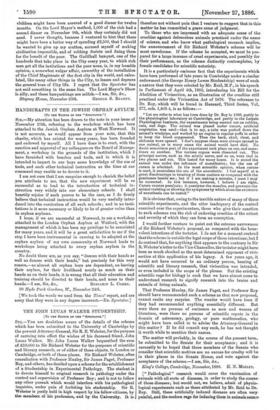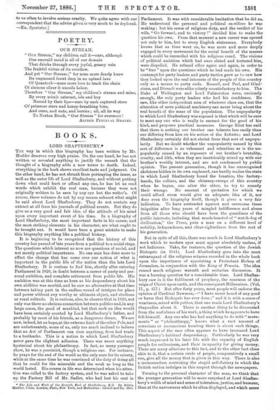THE JOHN LUCAS WALKER STUDENTSHIP.
rro rim EDITOR ON TEM " Beaurrava."] SIR,—Yon are doubtless aware of the details of the scheme which has been submitted to the University of Cambridge by the present Attorney-General, Sir R. E. Webster, for the purpose of carrying into effect the wishes of his deceased friend, John Lucas Walker. Mr. John Lucas Walker bequeathed the sum of £10,000 to Sir Richard Webster for the purposes of scientific and literary research, or of either of those objects, in London or Cambridge, or both of those places. Sir Richard Webster, after consultation with Professor Huxley, Sir James Paget, Professor Roy, and others, has decided upon a scheme for the establishment of a Studentship in Experimental Pathology. The student is to devote himself to original research in pathology under the- control and supervision of Professor Roy; and is not to follow any other pursuit which would interfere with his pathological inquiries, under pain of forfeiting his studentship. Sir R. 'Webster is justly held in high respect by his fellow-citizens, by the% members of his professio4 and by the University. It is
therefore not without pain that I venture to suggest that in this matter he has committed a grave error of judgment.
To those who are impressed with an adequate sense of the cruelties against defenceless animals practised under the name- of science, and who know what pathological research implies,. the announcement of Sir Richard Webster's scheme will be most unwelcome. If the scheme be accepted, we must be pre- pared for a large increase of cruel experiments, and possibly for- their performance, as the scheme distinctly contemplates, by female candidates for scientific notoriety.
It is a particularly ominous fact that the experiments which have been performed of late years in Cambridge under a similar' endowment (the George Henry Lewes Studentship) were of such a nature that they were selected by Mr. Reid, M.P., in his speech in Parliament of April 4th, 1883, introducing his Bill for the' Abolition of Vivisection, as an illustration of the cruelties still practised under the Vivisection Act of 1876. The reference to Dr. Roy, which will be found in Hansard, Third Series, Vol.. 277, cols. 1,403-4, is as follows :—
" Let me refer to what has been done by Dr. Boy in 1880, partly in the physiological laboratory at Cambridge and partly in the Leipsio- Physiological Institute, the experiments being carried out on rabbits,. cats, and dogs. The animal was placed under curare, artificial' respiration was used—that is to say, a tube was pushed down the animal's windpipe, and worked by an engine in regular puffs in order- to keep the blood oxygenated. Then the back, skull, chest, and abdomen were opened. I don't suppose these were always opened in one animal, as in many cases the animal would have died. Na. doubt sometimes part of the experiment took place on one, and some- times on another. The various organs were dissected out. The- principal nerves, such as the sciatic nerve, and so on, were tied in two places and cat. This lasted for many hours. It is stated the animal was under the influence of anasstheties ; but the use of curare is admitted. In the most scientific opinion, when curare- is used, it neutralises the use of the anasathetic. I feel myself at a. great disadvantage in treating of these matters as compared with the- gentlemen beside me ; but if I am making a mistake, I trust I may be corrected. In this instance however, I believe I am right.. Curare creates paralysis ; it paralyses the muscles, and prevents the animal resisting or showing the symptoms by which alone the existence. of ansesthesia can be tested."
It is obvious that, owing to the terrible nature of many of these' scientific experiments, and the utter inadequacy of the control- exercised over the experimenters, those who give their sanction. to such schemes run the risk of endowing cruelties of the extent- and severity of which they can form no conception.
I would further venture to point out the extreme narrowness- of Sir Richard Webster's proposal, as compared with the bene- volent intentions of the testator. I do not for a moment contend, that the scheme is outside the legal scope of those intentions ;but I do contend that, for anything that appears to the contrary in Sir- R. Webster's letter to the Vice-Chancellor, the testator might have- been as much shocked as the most determined opponent of vivi- section at this application of his legacy. A few years ago, it would not have occurred to an ordinary person, hearing of scientific and literary research, that vivisection was intended, or even included in the scope of the phrase. Bat the existing: scientific rage for biology is such that we have almost come to-
understand research to signify research into the brains and entrails of living animals.
That Professor Huxley, Sir James Paget, and Professor Boy' should have recommended such a scheme as that now proposed, cannot excite any surprise. The wonder would have been if they had recommended anything essentially different. But were there no persons of eminence as men and women of literature, were there no persons of scientific repute in the domain of astronomy, geology, or pure mathematics, who. might have been called in to advise the Attorney-General in- this matter? If he did consult any such, he has not thought it worth while to mention their names.
The matter will probably, in the course of the present term,. be submitted to the Senate for their acceptance ; and it is- earnestly to be hoped that those members of the Senate who consider that scientific motives are no excuse for cruelty will be in their places in the Senate House, and vote against the- acceptance of the scheme.—I am, Sir, So.,
King's College, Cambridge, November,1886. H. N. Mozi.Er.
[" Pathological" research would cover the vaccination of animals with all sorts of diseases, in order to study the course- of those diseases ; but would not, we believe, admit of physio.. logical experiments such as those attributed by Mr. Reid to-,Dx.. Roy. Still, these artificially induced diseases are often very- painfa], and the modern rage for inducing them in animals seems/ to us often to involve serious cruelty. We quite agree with our -correspondent that the advice given is very mach to be deplored. —En. Spectator.]







































 Previous page
Previous page